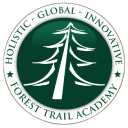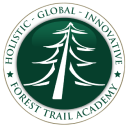Online Middle School
Grade 7 Comprehensive Science 2
This course is aligned with Florida’s Next Generation Sunshine State Standards for 7th grade science. This class focuses mainly on life sciences, with additional discussions of scientific inquiry and energy. The students will review the nature of science and how to design an effective experiment. They will practice using the scientific method in order to answer a question about their lives.
The students will then learn about sound and light, including why light reflects and why some materials allow light to pass through while others do not. They will then learn about energy transformations and the first and second laws of thermodynamics. The rock cycle and the types of rock, including what they tell us about the Earth’s history, are then discussed.
M/J Comprehensive Science 2 Course Outline
The students will learn how and why the Earth changes through events like earthquakes and volcanoes. They will then learn about ecosystems, how much they can support and why, and how they can be damaged. The students will also learn about how organisms can interact with each other in terms of biodiversity and symbiosis. The flow of energy in ecosystems is explained through the interpreting of food chains and food webs. The students will then learn about how organisms and species evolve over time through natural selection and in response to changes in the environment. Finally, the students will learn about heredity and reproduction, including how to use a Punnett square to predict the traits of offspring.
Course Objectives
- Describe the scientific method and explain the value of observation and measurement in scientific investigations.
- Describe the general nature of the Solar System, the Earth and Moon and their movements.
- Explain how various Earth materials are formed and how the Earth changes over time through storms and other natural events such as volcanic eruptions.
- Explain the concepts of force and motion and describe simple machines.
- Know the systems of the human body and their functions.
- Explain how living things respond to their environment and change over time
- Understand concepts of ecology, and define terms such as habitat, ecosystem, producer and consumer.
- Know resources that we obtain from the Earth and the affects of human population on those resources.
- Explain how air and water become polluted.
- Describe what biodiversity is and why it is important to Earth.

Course Outline
Introduction
- Introduction
- Understanding Plagiarism
- Course Description
- Pretest
- Assignment: Pretest
- Course Links
- MLA Formatting MSWord 2007
- MLA Documentation updates
- MLA Citation
- MLA Incorporating Sources
The Practice of Science
- Objectives and Vocabulary
- What is Science?
- Other Forms of Scientific Investigation
- Observations
- Variables and Constants
- Independent and Dependent Variables
- Assignment: Independent and Dependent Variables
- Repeated Trials
- Assignment: Repeated Trials
- Review
The Scientific Method Project
- Objectives
- The Scientific Method Project
- Project Guidelines
- Scientific Methods Steps 1 and 2
- Assignment: Scientific Method Steps 1 and 2
- Scientific Method Step 3
- Assignment: Scientific Method Step 3
- Scientific Method Step 4
- Assignment: Scientific Method Step 4
- Scientific Method Step 5
- Scientific Method Step 6
- Scientific Method Step 7
- Assignment: Scientific Method Steps 5-7
Energy: Sound and Light
- Objectives and Vocabulary
- Introduction to Energy
- Sound
- Speed of Sound
- Hearing Sound
- Quiz: Sound
- Light
- Colors
- Reflection
- Assignment: Reflection Art
- Transparent, Translucent, Opaque
- Quiz: Light
- Shadows
- Review and Quiz
- Quiz: Light and Sound
Energy: Transformations
- Objectives and Vocabulary
- Energy
- Kinetic and Potential Energy
- Energy Conversion
- Hydroelectric Dams
- Assignment: Energy Conversion
- Heat
- Heat Transfer
- Assignment: Heat Transfer
- Laws of Thermodynamics
- First Law of Thermodynamics
- Conservation of Energy
- Quiz: Total Energy
- Second Law of Thermodynamics
- Review and Quiz
- Quiz: Energy: Transformations
Earth Structures
- Objectives and Vocabulary
- Rocks and Minerals
- Igneous Rocks
- Sedimentary Rocks
- Metamorphic Rocks
- Handout: Types of Rocks
- Assignment: Types of Rocks
- Weathering
- Erosion
- Quiz: Erosion
- The Rock Cycle
- Essay: The Rock Cycle
- Rocks: Clues to the Past
- Layers of the Earth
- Layers of the Earth (Continued)
- Assignment: Layers of the Earth
- Review and Quiz
- Quiz: Earth Structures Unit Quiz
The Changing Earth
- Objectives and Vocabulary
- Moving Plates
- Handout: Pangaea
- Assignment: Pangaea Project
- Types of Plate Movement
- The Moving Earth
- Earthquakes
- Worksheet: The Moving Earth
- Essay: Earthquake Safety
- Volcanoes
- Eruptions
- Active and Inactive Volcanoes
- Worksheet: Volcanoes
- Mountain Building
- Ocean Ridges
- Review and Quiz
- Quiz: The Changing Earth Unit Quiz
- Midtest
- Assignment: Midtest
Ecology and Ecosystems
- Objectives and Vocabulary
- Ecology and the Environment
- Living and Non-Living
- Interactions with Biotic and Abiotic Features
- Worksheet: Biotic and Abiotic
- Limiting Factors
- Carrying Capactiy
- Worksheet: Limiting Factors and Carrying Capacity
- Organization of the Environment
- Quiz: Organization in the Environment
- Ecosystems
- Habitat
- Habitat Loss
- Extinct and Endangered Animals
- Global Warming
- Quiz: Polar Bear: Case Study
- Saving Species
- Assignment: Saving Species
- Review and Quiz
- Quiz: Ecology and the Environment Unit Quiz
Organism Interaction and Balance
- Objectives and Vocabulary
- Biodiversity
- Symbiosis
- Mutualism
- Commensalism
- Parasitism
- Assignment: Symbiosis in your Home
- Essay: Research
- Assignment: Relationships
- Changing Nature
- The Balance of Nature
- Cooperation and Competition
- Handout: Animal Needs
- Handout: Endangered Wolves
- Handout: Bringing Wolves Home
- Handout: Reintroducing Grey Wolves
- Assignment: Wolves Return to Yellowstone: A Case Study
- Review and Quiz
- Quiz: Organism Interaction and Balance Unit Quiz
Energy Flow in the Ecosystem
- Objectives and Vocabulary
- The Source of Energy for Life
- Producers, Consumers, and Decomposers
- Quiz: Producer, Consumer, and Decomposer
- Food Chains
- Food Webs
- Losing Energy
- Humans in the Food Web
- Assignment: Your Food Chain
- Eating Low on the Food Chain
- Worksheet: Food From a Distance
- The Web of Life
- Review and Quiz
- Quiz: Energy Flow in the Ecosystem
Evolution and Diversity of Organisms
- Objectives and Vocabulary
- Organisms and Species
- Responding to the Environment
- Adaptations
- Handout: Adaptations Research
- Assignment: Adaptations Research
- Variation Among Animals
- Mutations
- Essay: Variation and Mutation
- Natural Selection and Adaptations
- Handout: Natural Selection Lab
- Assignment: Natural Selection Lab
- The Fossils Record
- The Age of Fossils
- Review and Quiz
- Quiz: Evolution and Diversity of Organisms Unit Quiz
Heredity and Reproduction
- Objectives and Vocabulary
- Asexual Reproduction
- Sexual Reproduction
- Worksheet: Asexual and Sexual Reproduction
- Genes
- DNA
- Dominant and Recessive Traits
- Punnett Square
- Assignment: Mr. Mars Man Lab
- Mutations Part 2
- Selective Breeding
- Genetic Engineering
- Worksheet: Genetic Engineering Research
- Review and Quiz
- Quiz: Heredity and Reproduction
- Post-test
- Assignment: Post-test
Course Evaluation
- Handout: Course Evaluation
- Assignment: Course Evaluation

